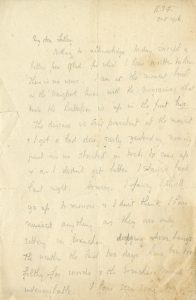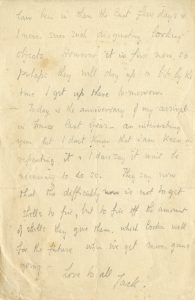Transcription
B. E. F.
31. 8. 1916.
My dear Father,
Nothing to acknowledge to-day, except a letter from Glad. for which I have written to her. There is no news. I am at the moment back in the transport line with the migraines, what time the Battalion is up in the front line.
The disease is very prevalent at the moment & I got a bad dose early yesterday morning just as we started on trek to come up & as I didn’t get better I stayed back last night. However I fancy I shall go up to-morrow & I don’t think I have missed anything as they are only sitting in trenches dodging whizz bangs. The weather the last two days has been too filthy for words & the trenches must be indescribable. I have seen some men who
[page]
have been in them the last few days & I never saw such disgusting looking objects. However it is fine now, so perhaps they will dry up a bit by the time I get up there to morrow.
To-day is the anniversary of my arrival in France last year – an interesting year but I don’t know that I am keen on repeating it & I daresay it won’t be necessary to do so. They say now that the difficulty [now] is not to get shells to fire, but to fire off the amount of shells they give them, which looks well for the future when we get more guns going.
Love to all
Jack.
Commentary
Since their engagement on the 21 August, the 8th Queen’s had been at rest behind the British front lines. The men attended concerts and Peirs organized football matches to keep them occupied. He also procured some beer for the men, which no doubt was appreciated, and Peirs seems to be in good spirits.
There is an interesting trait that we have noticed about Peirs, which his letters this week demonstrate. That is an unconquerable belief that Britain (and the allies) were eventually going to win the war. Even though Peirs had lived through a number of failed attacks and even though success in August of 1916 was measured by the yard, Peirs remained hopeful that the Germans would soon give in to the pressure that the allies were putting on them. Here is what he wrote home to his mother on the 26th.
I have just been reading Wednesday’s paper, which makes things out to be very hopeful. We seem to be gaining quite a lot as a whole & I should think it ought to increase. I heard last night that the French had advanced 1500 yds. in places which is some gain in these times.
In his letter to his father on the 27th there is some complaining about the usual stuff – rain, muddy trenches, and flies – but then Peirs wrote of Romania’s entry into the war on the side of the Allies.
We have just got a wire that Roumania has come in against Austria, which is rather cheering & ought to prove the last straw.
The reality proved to be far different. Romania’s entry certainly wasn’t the last straw – the war went on for two more years and Romania suffered greatly for the decision to enter the fray – but Peirs’s positivism indicates that he was paying attention to the bigger picture. We can speculate as to why he was doing so: his section of the Somme had become an attritional battle and he might have been looking for positive war news elsewhere.
He also wrote home to his sister Cecily about Romania.
We have had the news to-day that Roumania has come in, which everyone considers as the beginning of the end. Whatever else happens it ought to make the Bosch sit up & think a bit.
You can imagine Peirs and his fellow officers in their mess discussing this topic and speculating as to what the Romanian entry meant for their situation. If Peirs is accurately representing their feelings – a big ‘if’ – then morale was anything but low in their mess.
Peirs also wrote home on the subject of German prisoners of war. Prisoners can be useful sources of intelligence (in certain situations) and Peirs saw a degree of demoralization in the enemy. To his father, he wrote:
Incidentally I have just been reading extracts from German Prisoners Diaries which show that they are having the very deuce of a time from our artillery & that they don’t like it at all.
He also wrote to Cecily about riding past a group of demoralized German soldiers:
We also came across some gangs of Bosches – prisoners, whom they are now using on our roads – guarded by diminutive youths who have enlisted but are under age & have been claimed by their parents. So they are put on this kind of job, not that the Bosch would dream of escaping, as he is quite comfortable & as far as I can gather extremely glad to be out of it all.
Between Romanian entry and studying demoralized prisoners, Peirs had formed an opinion about the stress placed on Imperial Germany and its allies. Through that opinion, he saw some sort of silver lining to very difficult fighting along the Somme front.
The end of August saw Peirs behind the lines with a migraine headache. His men were at the front occupying support trenches near Delville Wood. The men were being shelled in their position and Peirs indicated that the trenches were filthy. No doubt miserable – even behind the lines a migraine and the constant thud of shells had to be brutal – he offered a bit of reflection to his father.
To-day is the anniversary of my arrival in France last year – an interesting year but I don’t know that I am keen on repeating it & I daresay it won’t be necessary to do so. They say now that the difficulty [now] is not to get shells to fire, but to fire off the amount of shells they give them, which looks well for the future when we get more guns going.
Peirs had been through a lot in his first year of war. Though he was ‘not keen to repeat it’ he certainly wasn’t morose about the things he witnessed. He was also hopeful that he wouldn’t have to repeat the experience – that the German army would be defeated – and that victory was closer at hand than we know, from hindsight, that it was.


